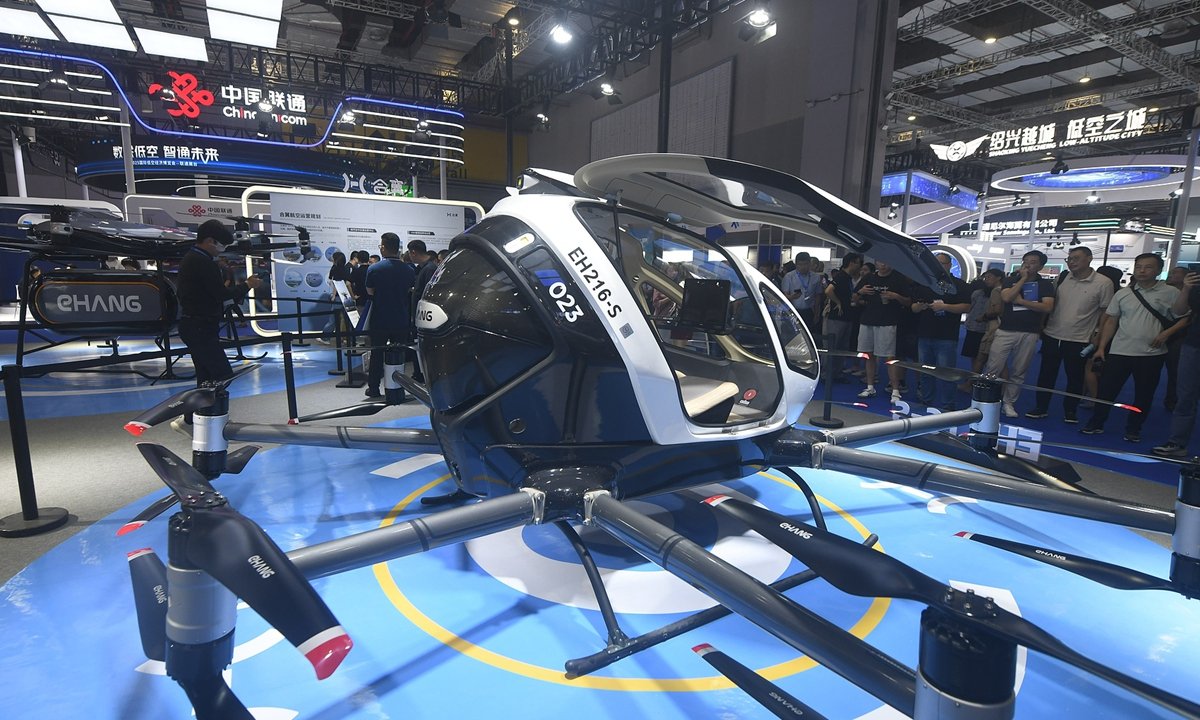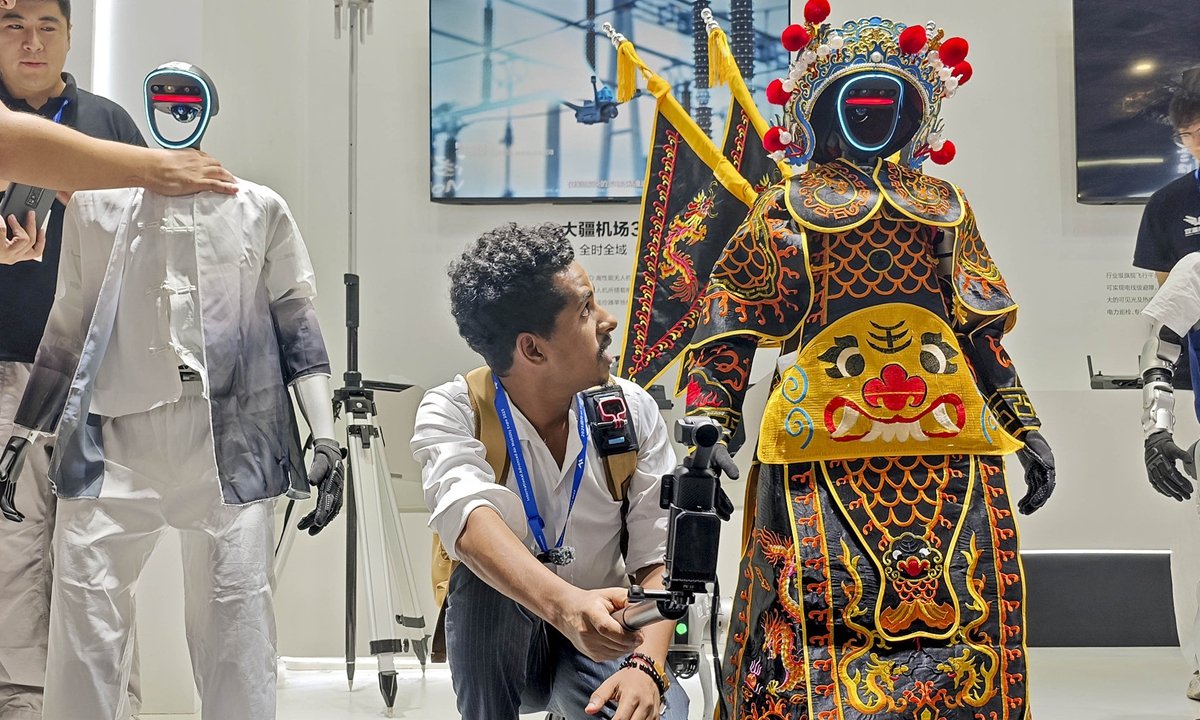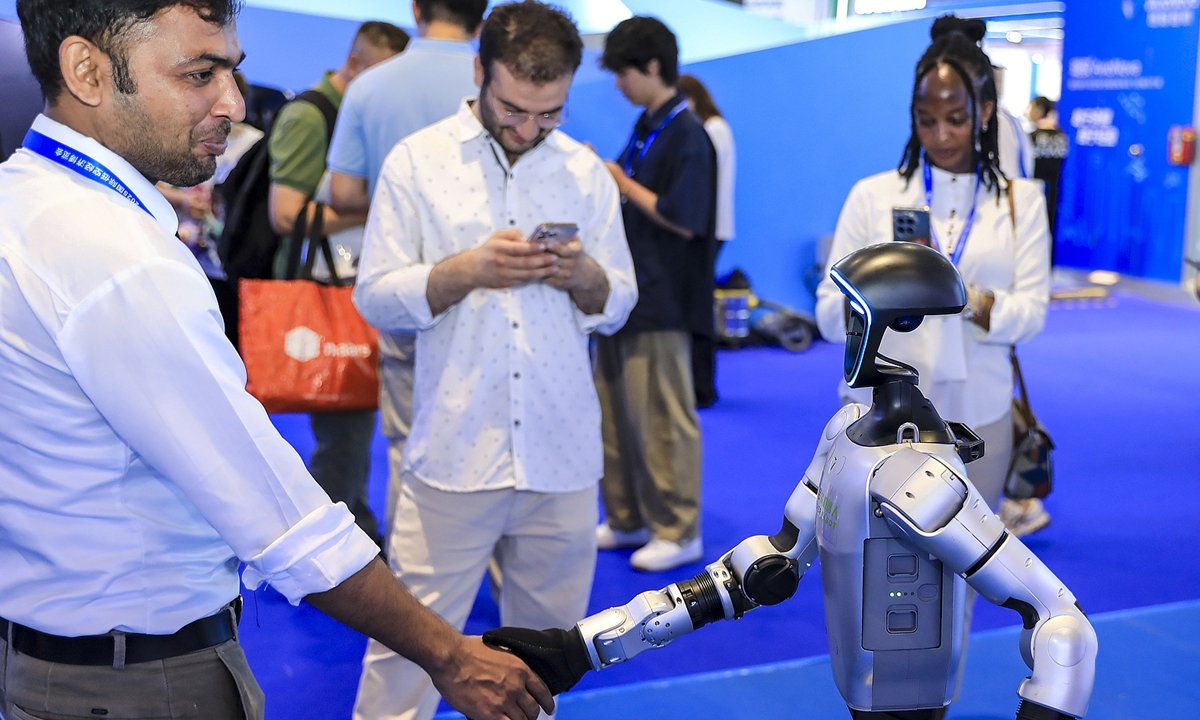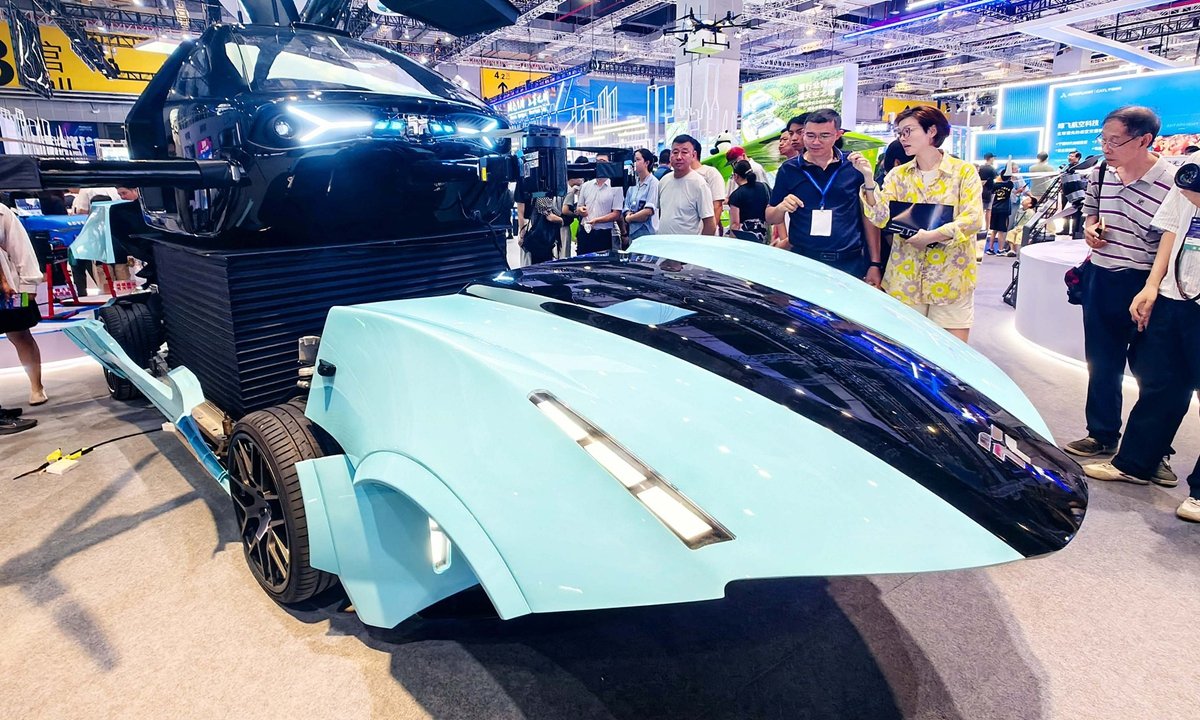Tools & Platforms
China’s intensive technology conferences draw global attention to AI devt and low-altitude economy

A passenger-carrying electric vertical takeoff and landing aircraft is on display at the International Advanced Air Mobility Expo in Shanghai on July 23, 2025. Photo: VCG
In 2025, a series of high-profile technology conferences in China, including the International Advanced Air Mobility Expo and the 2025 World AI Conference and High-Level Meeting on Global AI Governance, have drawn significant attention from global media, attracting numerous foreign delegates and exhibitors eager to explore China’s advancements in AI and the burgeoning low-altitude economy.
The International Advanced Air Mobility Expo is held in east China’s Shanghai from July 23 to 26, where nearly 300 exhibitors display their low-altitude infrastructure as well as manufacturing and supporting services, the Xinhua News Agency reported.
During the event, over 30 forums were organized, making it a focal point for the low-altitude economy sector this year. The expo showcased a vibrant and diverse landscape. New energy and intelligent industries, represented by drones and electric vertical takeoff and landing applications, shone brightly, with numerous renowned companies participating.
Leading enterprises in traditional general aviation from both China and abroad also gathered at the expo to display their latest achievements. Additionally, the event highlighted the deep integration of new technologies, materials, energy sources, and innovative finance with the low-altitude industry.
At the venue, a welcoming string ensemble intertwined with a drone “flash mob” performance, creating a spectacular fusion of technology and art. The Shanghai Services Federation, in collaboration with Shanghai Handong Machinery Technology, illuminated the night sky with a three-minute drone formation performance.
In terms of practical applications, the expo comprehensively showcased low-altitude products and solutions across various scenarios, including public safety, firefighting, emergency response, aerial mapping, agricultural and forestry protection, and drone formation performances.
As a new productive force and a strategic emerging industry, the low-altitude economy has received significant national attention in recent years, having been included in the Chinese government’s work report for two consecutive years since 2024. The Third Plenary Session of the 20th Central Committee of the Communist Party of China also outlined clear requirements for its development. Against this backdrop, the 2025 Expo actively responded to national strategies, establishing a high-level dialogue platform with an international perspective.
On July 23, the 24th China Internet Conference opened in Beijing. Themed “Data-Driven New Quality, Intelligence-Created Future,” this conference focused on accelerating the qualitative leap of internet technologies. Artificial intelligence, as a strategic technology leading the new wave of technological revolution and industrial transformation, has become a key driver of new productive forces. In recent years, the rapid evolution of AI technology has injected new momentum into various industries, continuously fostering new business models and promoting a more intelligent, efficient, green, and sustainable society, analysts said.
Meanwhile, the 2025 World AI Conference and High-Level Meeting on Global AI Governance in Shanghai has also garnered global attention. A spokesperson of China’s Ministry of Foreign Affairs stated on Thursday that the theme of this year’s conference is “Global Solidarity in the AI Era.” China has invited high-level representatives from over 40 countries and international organizations.
We hope that participating parties will have in-depth discussions on three major topics, namely deepening innovation cooperation and unleashing the intelligence dividend, promoting inclusive development and bridging the digital divide, and strengthening collaborative governance and ensuring AI for good, said the spokesperson.
Global Times

An overseas visitor takes a photo with a domestically produced humanoid robot at the International Advanced Air Mobility Expo in Shanghai on July 23, 2025. Photo: VCG

An airspace landscape formation drone is exhibited at the International Advanced Air Mobility Expo in Shanghai on July 23, 2025. Photo: IC

A foreign business representative interacts with a humanoid robot at the International Advanced Air Mobility Expo in Shanghai on July 23, 2025. Photo: VCG

A participant tries out a wearable innovative device at the 24th China Internet Conference in Beijing on July 23, 2025. Photo: IC

Global delegates attend the World Internet Conference Digital Silk Road Development Forum held in Quanzhou, East China’s Fujian Province, on July 25, 2025. Photo: VCG

A “flying car” that can switch between car and flight modes at any time is on display at the International Advanced Air Mobility Expo in Shanghai on July 23, 2025. Photo: VCG
Tools & Platforms
AI engineers are being deployed as consultants and getting paid $900 per hour

AI engineers are being paid a premium to work as consultants to help large companies troubleshoot, adopt, and integrate AI with enterprise data—something traditional consultants may not be able to do.
PromptQL, an enterprise AI platform created by San Francisco-based developer tooling company Hasura, is doling out $900-per-hour wages to its engineers tasked with building and deploying AI agents to analyze internal company data using large language models (LLMs).
The price point reflects the “intuition” and technical skills needed to keep pace with a rapidly-changing technology, Tanmai Gopal, PromptQL’s cofounder and CEO, told Fortune.
Gopal said the company hourly wage for AI engineers as consultants is “aligned with the going rate that you would see for AI engineers,” but that “it feels like we should be increasing that price even more,” as customers aren’t pushing back on the price PromptQL sets.
“MBA types… are very strategic thinkers, and they’re smart people, but they don’t have an intuition for what AI can do,” Gopal said.
Gopal declined to disclose any customers that have used PromptQL to integrate AI into their businesses, but says the list includes “the largest networking company” as well as top fast food, e-commerce, grocery and food delivery tech companies, and “one of the largest B2B companies.”
Oana Iordăchescu, founder of Deep Tech Recruitment, a boutique agency focused on AI, quantum, and frontier tech talent, told Fortune enterprises and startups are competing for senior AI engineers at “unprecedented rates,” and which is leading to wage inflation.
Iordăchescu said the wages are priced “far above even Big Four consulting partners,” who often make around $400 to $600 per hour.
“Traditional management consultants can design AI strategies, but most lack the hands-on technical expertise to debug models, build pipelines, or integrate systems into legacy infrastructure,” Iordăchescu said. “AI engineers working as consultants bridge that gap. They don’t just advise, they execute.”
AI consultant Rob Howard told Fortune he wasn’t surprised at “mind-blowing numbers” like a $900-per-hour wage for AI consulting work, as he’s seen a price premium on projects that have an AI component while companies rush to adopt it into their businesses.
Howard, who is also the CEO Innovating with AI, a program to teach people to become AI consultants in their own right, said some students of his have sold AI trainings or two-day boot camps that net out to $400 or $500 per hour.
“The pricing for this is high in general across the market, because it’s in demand and new and relatively rare to find, you know, people who are qualified to do it,” Howard said.
A recent report published by MIT’s NANDA initiative, revealed that while generative AI holds promise for enterprises, 95% of initiatives to drive rapid revenue growth failed. Aditya Challapally, the lead author of the report and a research contributor to project NANDA at MIT, previously told Fortune the AI pilot program failures did not fall on the quality of the AI models, but the “learning gap” for both tools and organizations.
“Some large companies’ pilots and younger startups are really excelling with generative AI,” Challapally told Fortune earlier this month. Startups led by 19- or 20-year-olds, for example, “have seen revenues jump from zero to $20 million in a year,” he said.
“It’s because they pick one pain point, execute well, and partner smartly with companies who use their tools,” he added.
Jim Johson, an AI consulting executive at AnswerRocket, told Fortune the $900-per-hour wage “makes perfect sense” when considering companies have spent two years experimenting with AI and “have little to show for it.”
“Now the pressure’s on to demonstrate real progress, and they’re discovering there’s no easy button for enterprise AI,” Johnson said. “This premium won’t last forever, but right now companies are essentially buying insurance against joining that 95% failure statistic.”
Gopal said PromptQL’s business model to have AI engineers serve as both consultants and forward deployed engineers (FDEs)—hybrid sales and engineering jobs tasked with integrating AI solutions—is what makes their employees so valuable.
This new wave of AI engineer consultants is shaking up the consulting industry, Gopal said. But he sees his company as helping shift traditional consulting partnership expectations and culture.
“The demand is there,” he said. “I think what makes it hard is that leaders, especially in some of the established companies… are kind of more used to the traditional style of consultants.”
Gopal said the challenge for his company will be to “drive that leadership and education, and saying, ‘Folks, there is a new way of doing things.’”
Tools & Platforms
AI is introducing new risks in biotechnology. It can undermine trust in science

The bioeconomy is entering a defining moment. Advances in biotechnology, artificial intelligence (AI) and global collaboration are opening new frontiers in health, agriculture and climate solutions. Within reach are safe and effective vaccines and therapeutics, developed within days of a new outbreak, precision diagnostics that can be deployed anywhere and bio-based materials that replace fossil fuels.
But alongside these breakthroughs lies a challenge: the very tools that accelerate discovery can also introduce new risks of accidental release or deliberate misuse of biological agents, technologies and knowledge. Left unchecked, these risks could undermine trust in science and slow progress at a time when the world most needs solutions.
The question is not whether biotechnology will reshape our societies: it already is. The question is whether we can build a bioeconomy that is responsibly safeguarded, inclusive and resilient.
The promise and the risk
AI is transforming biotechnology at a remarkable speed. Machine learning models and biological design tools can identify promising vaccine candidates, design novel therapeutic molecules and optimize clinical trials, regulatory submissions and manufacturing processes – all in a fraction of the time it once took. These advances are essential for achieving ambitious goals such as the 100 Days Mission, the effort to compress vaccine development timelines in response to future emergent pandemics within 100 days, enabled by AI-driven tools and technologies.
The stakes extend beyond security. Without equitable access to AI-driven tools, low- and middle-income countries risk falling behind in innovation and preparedness. Without distributed infrastructure, inclusive training datasets, skilled personnel and role models, the benefits of the bioeconomy could remain concentrated in a few regions, perpetuating inequities in health security, technological opportunity and scientific progress.
Building a culture of responsibility
Technology alone cannot solve these challenges. What is required is a culture of responsibility embedded across the entire innovation ecosystem, from scientists and startups to policymakers, funders and publishers.
This culture is beginning to take shape. Some research institutions are integrating biosecurity into operational planning and training. Community-led initiatives are emerging to embed biosafety and biosecurity awareness into everyday laboratory practices. International bodies are responding as well: in 2024, the World Health Organization adopted a resolution to strengthen laboratory biological risk management, underscoring the importance of safe and secure practices amid rapid scientific progress.
The Global South is leading the way in practice. Rwanda, for instance, responded rapidly to a Marburg virus outbreak in 2024 by integrating biosecurity into national health security strategies and collaborating with global partners. Such exemplars demonstrate that with political will and the right systems in place, emerging innovation ecosystems play leadership roles in protecting communities and enabling safe participation in the global bioeconomy.
Why inclusion and equity matter
Safeguarding the bioeconomy is not only about biosecurity; it is also about inclusion. If only a handful of countries shape the rules, control the infrastructure and train the talent, innovation will remain unevenly distributed and risks will multiply.
That is why expanding AI and biotechnology capacity globally is so urgent. Distributed cloud infrastructure, diverse training datasets and inclusive training programmes can help ensure that all regions are equipped to participate. Diverse perspectives from scientists, regulators and civil society, across the Global South and Global North, are essential to evaluating risks and identifying solutions that are fair, secure and effective.
Equity is also a matter of resilience. A pandemic that spreads quickly will not wait for producer countries to supply vaccines and treatments. A bioeconomy that works for all must empower all to respond.
The way forward
The World Economic Forum, alongside partners such as CEPI and IBBIS, continues to bring together leaders from science, industry and civil society to mobilize collective action on these issues. At this year’s BIO convention, for example, a group of senior health and biosecurity leaders from industry and civil society met to discuss the foundational importance of biosecurity and biosafety for life science, to future-proof preparedness and innovation ecosystems for tomorrow’s global bioeconomy and to achieve the 100 Days Mission.
The bioeconomy stands at a crossroads. On one path, innovation accelerates solutions to humanity’s greatest challenges: pandemics, climate change and food security. On the other path, the same innovations, unmanaged, could deepen inequities and expose society to new vulnerabilities.
The choice is ours. By embedding responsibility, biosecurity and inclusive governance into today’s breakthroughs, we can secure the foundation of tomorrow’s bioeconomy.
But responsibility cannot rest with a few institutions alone. Building a secure and equitable bioeconomy requires a shared commitment across regions, sectors and disciplines.
The bioeconomy’s potential is immense. Realizing it safely will depend on the choices made now. Choices that determine not just how we innovate, but how we safeguard humanity’s future.
This article is republished from World Economic Forum under a Creative Commons license. Read the original article.
Tools & Platforms
Server Error – 500 India TV News

-

 Business2 weeks ago
Business2 weeks agoThe Guardian view on Trump and the Fed: independence is no substitute for accountability | Editorial
-
Tools & Platforms1 month ago
Building Trust in Military AI Starts with Opening the Black Box – War on the Rocks
-

 Ethics & Policy2 months ago
Ethics & Policy2 months agoSDAIA Supports Saudi Arabia’s Leadership in Shaping Global AI Ethics, Policy, and Research – وكالة الأنباء السعودية
-

 Events & Conferences4 months ago
Events & Conferences4 months agoJourney to 1000 models: Scaling Instagram’s recommendation system
-

 Jobs & Careers3 months ago
Jobs & Careers3 months agoMumbai-based Perplexity Alternative Has 60k+ Users Without Funding
-

 Podcasts & Talks2 months ago
Podcasts & Talks2 months agoHappy 4th of July! 🎆 Made with Veo 3 in Gemini
-

 Education2 months ago
Education2 months agoVEX Robotics launches AI-powered classroom robotics system
-

 Education2 months ago
Education2 months agoMacron says UK and France have duty to tackle illegal migration ‘with humanity, solidarity and firmness’ – UK politics live | Politics
-

 Podcasts & Talks2 months ago
Podcasts & Talks2 months agoOpenAI 🤝 @teamganassi
-

 Funding & Business3 months ago
Funding & Business3 months agoKayak and Expedia race to build AI travel agents that turn social posts into itineraries


